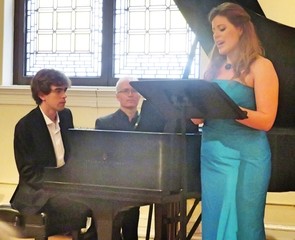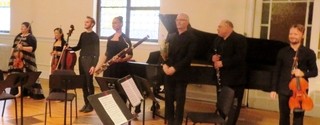|
Back
Conductors off the Podium New York
Good Shepherd Church
04/08/2019 -
Dimitri Mitropoulos: Kassiani
Arturo Toscanini: Two Songs: “Desolazione” & “Son gelosa”
George Szell: Piano Quintet in E Major, Opus 2
Jens Nyggard: Cadenza for W. A. Mozart’s Piano Concerto No. 24, K. 491
Felix Weingartner: Octet in G Major, Opus 73
Kristina Bachrach (Soprano)
Jupiter Symphony Chamber Players: Vadim Lando (Clarinet), Marlène Ngalissamy (Bassoon), Karl Kramer (French Horn), Elizabeth Fayette, Lisa Shihoten (Violins), Maurycy Banaszek (Viola), Coleman Itzkoff (Cello), Albert Cano Smit (Piano)

A. Cano Smit, K. Bachrach (© Samuel A .Dog)
“I never use a score when conducting. Does a lion-tamer enter a lion-cage with a book about lion-taming?”
Dimitri Mitropoulos
“I love music more than I love myself. But, music is more loveable than I am.”
George Szell
The Jupiter Symphony series is a tiny New York jewel, a joy for those discriminating audiences who crowd into a church adjacent to Lincoln Center on afternoons and evenings. As well as a home for some of our best musicians.
They aren’t names like Ax or Ma or Hamelin. But yesterday afternoon, the First Violin of the Vega Quartet, one of the world’ great horn players, a Congo/Brazzaville/Russian/Canadian prize-winning bassoonist and a 21-year-old pianist who has won every prize in the book all participated in a program of characteristically rare selections.
In this case, Jupiter Symphony not only gave one of the Mozart cadenzas written by the founder, the late Jens Nygaard–a scintillating cadenza which encompassed the themes of the original concerto–but a rare reading of works written by conductors.
Nowadays, the conductor-composer is not unusual. Boulez, Bernstein, and Salonen are famed for both talents. But who ever heard music written by Toscanini, by Szell or Weingartner? They may have their music on YouTube, but one hearing is enough. Yesterday afternoon, we heard more endearing works.
Toscanini’s two songs were played and sung by Albert Cano Smit and soprano Kristina Bachrach with unerring ease. Nothing was revolutionary here: they were obviously written in the conductor’s earliest years, in 1885. Most impressive, though, was the ease, the absolutely appropriateness of the melodies. One heard 18th Century Italian art song, like Caldara. But one also heard in the second song, a chromaticism which presaged Puccini. Most impressive was how perfect piano and voice blended. Obviously the early marks of a great operatic conductor.
The most surprising work, by far, was the opening Kassiani, a song written by Dimitri Mitropoulos. (The title refers to one of Greece’s most astonishing composers, Saint Kassiani, a Greek Orthodox nun.) Though they deny it, Mitropoulos was literally forced out of the New York Philharmonic because of being unashamedly homosexual. One of his persecutors was the ambitious Leonard Bernstein, who was still in the closet.
The music itself was, like Mitropoulos’ conducting, astonishing. Written in 1919, the piece was an agonizing poem whose every note step by step, was a cry for help. It wasn’t atonal, but did have the emotional power of Alban Berg, and was a stunning start.
I discovered that Mitropoulos wrote many other songs at that period, and oh, how I would like them to be taken up singers today.
The two chamber works were interesting for a single hearing, though I had heard them several years ago at Jupiter. George Szell wrote his Piano Quintet when he was 14-years-old. For sheer competence, it showed a composer of late 19th Century power. Though perhaps not quite honest. One thinks of Szell as the ultimate cosmopolitan urbanite, and this start had a rustic Dvorák nature-loving beginning, continuing to its Brahmsian final movements.
Again, Mr. Cano Smit was the superb pianist, and the quartet played a piece distinguished by great competence. After all, George Szell was famed for not only knowing but playing every instrument in the orchestra. Five different instruments were a walk in the arboreal park!

E. Fayette, L. Shihoten, C. Itzkoff, M. Ngalissamy, K. Kramer,
V. Lando, M. Banaszek (© Samuel A. Dog)
The entire Jupiter Chamber Symphony ensemble played Felix Weingartner’s Octet. This was no Beethoven’s style wind octet. Here, clarinetist Vadim Lando, bassoonist Marlène Ngalissamy and the world-famed horn player Karl Kramer provided the sounds of nature to the usual piano and string group.
The Octet was written in 1925, though it had all the echoes of Mahler’s First Symphony in miniature for the first movement. The second was a kinda yucky theme and variations, though the following minuet was graceful enough.
The finale was delightful. A syncopated march theme (a toe-tapping march theme) with even more invention for the conclusion.
One was not unhappy that all four conductors followed their careers at the podium rather than the writing-desk. In the meantime, Jupiter Symphony demonstrated that their creativity and re-creativity could be simultaneously intriguing.
Harry Rolnick
|